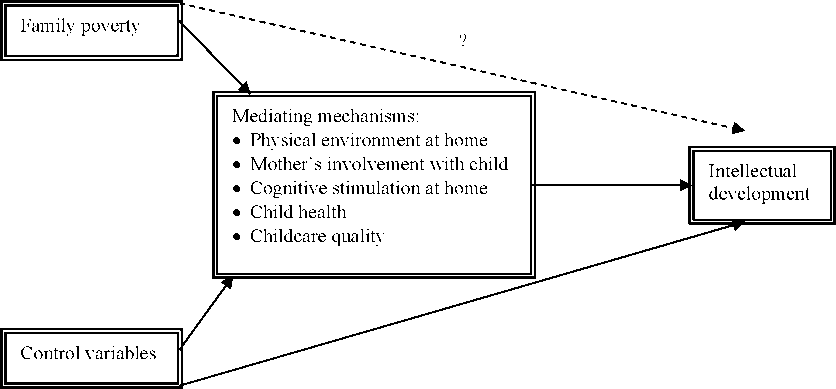More complex modelling
Box 12: A conceptual framework for the mediating mechanisms of the effects of poverty on
intellectual development

Source: Guo & Harris, 2000, 432
Guo and Harris’ theoretical model depicts family poverty as affecting children’s
intellectual development through these five specific mediating mechanisms (physical
environment, parenting style, cognitive stimulation, child health, and pre-school
quality). In terms of the general model of this report, these mechanisms are a mix of
characteristics of the family context and proximal processes. Controls are introduced
for other family and child distal factors, such as mothers’ education, mothers’
cognitive ability, mothers’ and children’s age, family structure, marital status and
region. The authors posit that once a comprehensive set of mediating variables have
been accounted for there is no theoretical reason why poverty should affect
intellectual development directly. This hypothesis is represented by the dotted line in
Box 12.
They examined the links between poverty and each of these mechanisms, the links
between each of the mechanisms and the child’s intellectual development and the
direct link between poverty and intellectual development. Two main findings
emerged. First, the influence of family poverty on children’s intellectual development
is mediated completely by the intervening mechanisms measured by the five
constructed latent variables, with poverty exerting no direct effect on children’s
intellectual development.
Secondly, cognitive stimulation in the home was the main mediating factor of family
poverty in influencing children’s intellectual development. Poverty exerts a large
negative effect on cognitive stimulation in the home. In turn, this cognitive
stimulation environment exerts a large positive effect on intellectual development.
76
More intriguing information
1. Demographic Features, Beliefs And Socio-Psychological Impact Of Acne Vulgaris Among Its Sufferers In Two Towns In Nigeria2. The name is absent
3. Multiple Arrhythmogenic Substrate for Tachycardia in a
4. ARE VOLATILITY EXPECTATIONS CHARACTERIZED BY REGIME SHIFTS? EVIDENCE FROM IMPLIED VOLATILITY INDICES
5. The purpose of this paper is to report on the 2008 inaugural Equal Opportunities Conference held at the University of East Anglia, Norwich
6. The Nobel Memorial Prize for Robert F. Engle
7. HEDONIC PRICES IN THE MALTING BARLEY MARKET
8. THE CO-EVOLUTION OF MATTER AND CONSCIOUSNESS1
9. Long-Term Capital Movements
10. The name is absent